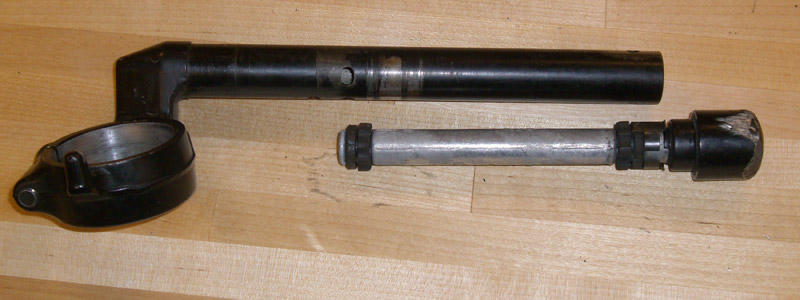Difference between revisions of "Damping Handlebar Vibration"
(→Aftermarket Options) |
(→Welding it in) |
||
| Line 47: | Line 47: | ||
Make sure to smooth everything out nice, especially on the throttle side.<br> | Make sure to smooth everything out nice, especially on the throttle side.<br> | ||
[[Image:Barweight9.jpg]]<br><br> | [[Image:Barweight9.jpg]]<br><br> | ||
| + | ===Opinion=== | ||
| + | Considering my bar end had been broken off in a recent crash and this was mostly a repair, I'm happy to have it mounted again. | ||
| + | The additional weight is a benefit. It makes the grip slightly more comfortable, slightly less buzzy. The difference is not dramatic, just a subtle change. | ||
| + | |||
| + | Doing this is probably worth it when you have a new bike apart to prep it, or during other service. It is also a good thing to try if you are having problems with your hands. | ||
[[category:motorcycle]] | [[category:motorcycle]] | ||
[[category:controls (Motorcycle)]] | [[category:controls (Motorcycle)]] | ||
Revision as of 16:30, 7 November 2006
BUZZZZZZ....
A vibrating handgrip will cause discomfort and the hand to fall asleep. Weight is usually the fix.
Stock handlebars will almost always have some sort of weight inside. This is to reduce the vibrations at the bar. A problem for the non-racing rider is that these weights are kept to a minimum to score points with magazine editors regarding overall bike weight. So our bikes are light, but they hurt to ride. Let's choose to add a little weight and make the bike far more comfortable to ride.
Contents
Aftermarket Options
The aftermarket has a few examples of large bolt on weights for clip-ons to fight this.
Products that should be avoided:
Stock Clip-on Modification
It would be most effective to add the weight at the very end of the bar, but this tends to be very bulky, leading to other problems. So I will add more weight to the inside of the bar.
The stock 2005 CBR600RR handlebar weight configuration.

Planning
The planned upgrade.
An improvement over this design would be one that is more flexible within the bar. This will help protect the bar when the bike is dropped.

Drawing of part
Making the part
Tapping the bar.

The bar needs a 2mm step cut in it to work with the stock bar end.

Machining the step

Comparison
Comparing the two configurations.

Stock parts. 130g. Not very heavy.

The new parts weigh 166g more than stock. Thats over 1/3 pound heavier.

Welding it in
The quick and easy way to attach the weight is to use a plug (or rosette) weld in the already existing end hole. Try to put a bunch of RTV in the handlebar behind the weld area. This will eliminate the chance of rattling.
One mistake that was made during this fabrication was that the plug should have extended out of that bar by 1-2mm. The stock right side bar is very cramped and every spare milimeter helps.

Make sure to smooth everything out nice, especially on the throttle side.

Opinion
Considering my bar end had been broken off in a recent crash and this was mostly a repair, I'm happy to have it mounted again.
The additional weight is a benefit. It makes the grip slightly more comfortable, slightly less buzzy. The difference is not dramatic, just a subtle change.
Doing this is probably worth it when you have a new bike apart to prep it, or during other service. It is also a good thing to try if you are having problems with your hands.